
.jpg)
|
|
||
|
Lord of the Flies |
||
|
|
||
| Directed by Cassie Gillen & Emily Youtt | ||
|
|
|
|
|
at Main Street Studios
|
||
|
|
||
|
|
|
|
Follow Us:
Content Warnings
Use of flashing light effects, animal cruelty, animal death, death, on-stage violence, adult language, demonic imagery, and blood & gore (staged effects)
Directors' Notes
Lord of the Flies first found me in my sophomore year of high school. We had just started chapter one, when all of a sudden COVID happened and now we were reading from home. This made the book easy to ignore. No one could tell if I was reading or not anyway. I’d done just fine with spark notes before. Eventually the assignment ended, and my book remained relatively untouched.
But COVID went on, and I was getting bored. There was nothing else to do, other than puzzles with my mom, and she was better than me at puzzles so I lost interest in that pretty quickly too. So I picked up my copy, curious about what my English teacher had been preaching about. And in just one evening I went through the story of the island, the shell, the fire, and the transition from boy to beast.
Cut to my next sophomore year, here at Fredonia, and a new friend told me she might pitch this play to PAC. At first my involvement was minimal, but as I read the play, and thought about the story, I knew I needed to work on this production. Ideas about staging were constantly flooding my mind, and soon the idea of two Ralph’s became something I couldn’t shake, and really wanted to see.
Ralph isn’t good or bad. He knows the right thing, but sometimes he would rather fit in. Just like everyone. Just like me. What would it mean to see the juxtaposition of humanity up on stage? Moreover, is there any humanity left on stage by the end of this story? It’s hard to say. But I know it’s a message we need to hear. The fighting on that island is senseless much like so much of the fighting happening around us now. Lord of the Flies is the story of what happens if we don’t lean on each other. What happens if we do?
- Cassie Gillen
The Lord of the Flies is a show that has changed my life on several occasions. In my freshman year of high school we read the book and it fell into a category of work that I call “hate to read, love to discuss.” While I truly and earnestly dreaded opening up that book, I did so every night so that I could participate in and understand the discussions we were having, questions about humanity: how we get it, how we lose it, and how we get it back, IF we can get it back. Questions like is humanity inherently good or bad? My answer has always been that we are good, we are predisposed to love, collaborate, and nurture. There are obstacles, but when you strip it all back, humankind isn’t so bad.
My sophomore year of high school our theatre company put on The Lord of the Flies. My first introduction to the play. I auditioned and was not cast (the correct decision by the way). My desire to participate in the show regardless left me on tech, constructing the set and scrubbing fake blood out of shirts by hand every night. Though I couldn’t say why (I had been on crew before) this marked the last time I ever auditioned for a show. And without Lord of the Flies I can safely say I would not be here at Fredonia with the friends I have today. I would not have chosen the career path that I have.
Lord of the Flies was my COVID show. It has always felt like a door left open to me. One that desperately needed to be closed. I originally wanted to pitch Lord of the Flies for somebody else to direct, but the further I went with the concept the less I trusted anybody else to take on this project and treat it with the care it deserves. Enter my co-director, who I was not close with at the time. The concept of two Ralphs was pitched to me and that was the moment I knew there was somebody else who understood this project the way I did. Somebody who felt it just as deeply.
The show has given us the opportunity to be Ralph several times. It has given us the option to do the right thing or the thing that will make us well liked. We have always tried to steer our choices to the right thing, even when it is the hard thing, even when people like us less as a result. Something I hope we can all do a little more.
- Emily Youtt
Dramaturg's Note
“Power tends to corrupt and absolute power corrupts absolutely.”
This quote from English historian and politician John Dalberg-Acton, better known as Lord Acton, is one that most people are familiar with. However, many have never heard the rest of the quote, which reads:
“Great men are almost always bad men, even when they exercise influence and not authority; still more when you superadd the tendency of the certainty of corruption by authority.”
How does a person acquire power, and how does obtaining it change them?
William Golding’s 1954 novel Lord of the Flies, while often written off as just another book assigned in high school English class, examines these questions through the microcosm of a group of schoolboys on an island. On this island there is a vacuum of power, and multiple people vie for the role of leader. Their tactics vary, but many mirror the actual tactics used by dictators throughout history to gain power. By placing the story in such a distant setting and making the key players children, Golding allows audiences to consider the ethical ramifications of these actions and whether the ends justify the means. This play, adapted for the stage by Nigel Williams, puts the action right in front of you and forces you to watch these young kids be manipulated into participating in horrible acts and taking pride in them. The visceral disgust this evokes in audiences encourages us to consider what we would do if faced with a similar dilemma.
This story of power and the games we play to get it is as relevant as ever in our current political climate. We often look back at dictators from history and think, “Oh, that could never happen again. We’d see it coming this time.” But it keeps happening. We are watching history begin to repeat itself, but a large portion of the public is convincing itself that it isn’t happening. This story is important because it shows how easily we can be manipulated into being complicit in horrific things if we do not recognize the signs.
See the signs. Speak up. Do not let this become normal.
-Katherine Eichenberger
Cast
Creative Team
Cassie Gillen
Emily Youtt
Gabbi Farr
Carder Pawlak
Fisher Sullivan
Katherine Eichenberger
Harper Bogan
Joseph Morcelle
Jaydon Zullo
Jharrel Liam Bernardo
Mia Rivas
Simon Szentgyorgyi
Madison Conklin
Viktor Feness
Meet the Company
Luke DiPirro
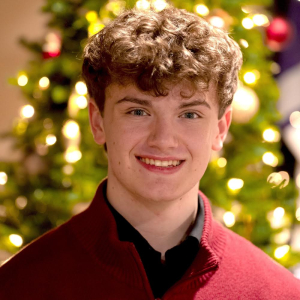 Luke DiPirro [he/him] is a freshman BFA Acting major from Buffalo, NY. This is his debut PAC show at Fredonia. He is thrilled to be a part of this amazing production. Luke would like to thank his family and friends. As well as his amazing directors, cast, and crew for this incredible opportunity!
Luke DiPirro [he/him] is a freshman BFA Acting major from Buffalo, NY. This is his debut PAC show at Fredonia. He is thrilled to be a part of this amazing production. Luke would like to thank his family and friends. As well as his amazing directors, cast, and crew for this incredible opportunity!
Bishop Warren Christy
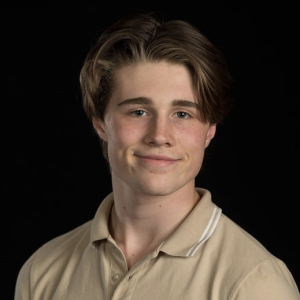 Bishop Warren Christy [he/him] This is Bishop’s first show in PAC! He loved theatre in high-school and is very grateful to be on stage again. Bishop would like to thank the cast and crew of Lord of the Flies as well as the greater theatre community in Fredonia for welcoming him and being so supportive of his efforts.
Bishop Warren Christy [he/him] This is Bishop’s first show in PAC! He loved theatre in high-school and is very grateful to be on stage again. Bishop would like to thank the cast and crew of Lord of the Flies as well as the greater theatre community in Fredonia for welcoming him and being so supportive of his efforts.
Emma Leahy
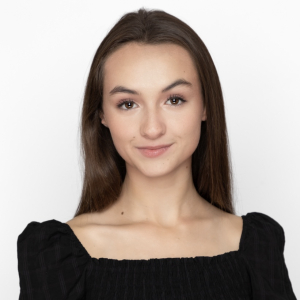 Emma Leahy [she/her] is a sophomore BFA Musical Theater major and this is her second PAC show! Her main stage credits include Legally Blonde (ensemble, Vivienne U/S) and her PAC credits include Spelling Bee (Logainne). This is the first straight play she’s ever been in and she’s so happy to be a part of such a wonderful cast!
Emma Leahy [she/her] is a sophomore BFA Musical Theater major and this is her second PAC show! Her main stage credits include Legally Blonde (ensemble, Vivienne U/S) and her PAC credits include Spelling Bee (Logainne). This is the first straight play she’s ever been in and she’s so happy to be a part of such a wonderful cast!
Tali Kam
 Tali Kam [she/her] is thrilled to be making her PAC debut in Nigel Williams’ Lord of the Flies! Tali is a freshman Acting major and History minor hailing from Westchester, New York. Her previous credits include: Mercutio (Romeo & Juliet), Pontius Pilate (Jesus Christ Superstar), & Mrs. Bennet (Pride and Prejudice). Tali is also a member of S.T.E.P.S and a production director assistant at Fredonia Radio Systems. When offstage she can be spotted taking photos, looking out of windows pensively, listening to classic smooth rock of the 1970s, or hunched over her laptop typing away (as she is doing now). Tali would like to give thanks to the wonderful cast and crew of LOTF for all their hard work and for creating such a nurturing environment. Love, thanks, and a courteous hat tip to Mom, Dad, and Eddie!! Enjoy the show!
Tali Kam [she/her] is thrilled to be making her PAC debut in Nigel Williams’ Lord of the Flies! Tali is a freshman Acting major and History minor hailing from Westchester, New York. Her previous credits include: Mercutio (Romeo & Juliet), Pontius Pilate (Jesus Christ Superstar), & Mrs. Bennet (Pride and Prejudice). Tali is also a member of S.T.E.P.S and a production director assistant at Fredonia Radio Systems. When offstage she can be spotted taking photos, looking out of windows pensively, listening to classic smooth rock of the 1970s, or hunched over her laptop typing away (as she is doing now). Tali would like to give thanks to the wonderful cast and crew of LOTF for all their hard work and for creating such a nurturing environment. Love, thanks, and a courteous hat tip to Mom, Dad, and Eddie!! Enjoy the show!
Sunny Custer
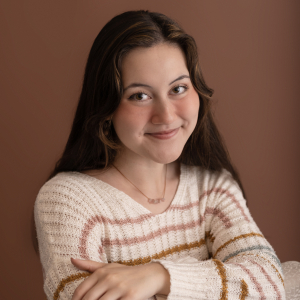 Sunny Custer [she/her] is a sophomore BFA Musical Theatre major from Medina, Ohio, and she is absolutely thrilled to be in Fredonia PAC’s production of Lord of the Flies! She was most recently in the ensemble of The Book Women at SUNY Fredonia last semester, and she was in Fredonia PAC’s production of Too Much Light Makes the Baby Go Blind last year. Up next, she will be Fredonia’s The Sound of Music Commencement Eve Pops Concert as Louisa von Trapp. Sunny is also the Vice President/Secretary of Fredonia’s acapella group, Premium Blend, a member of APO honors society, and she studies voice with Professor Amanda Bottoms. She is very grateful to be performing in Lord of the Flies this weekend and hopes you enjoy the show!
Sunny Custer [she/her] is a sophomore BFA Musical Theatre major from Medina, Ohio, and she is absolutely thrilled to be in Fredonia PAC’s production of Lord of the Flies! She was most recently in the ensemble of The Book Women at SUNY Fredonia last semester, and she was in Fredonia PAC’s production of Too Much Light Makes the Baby Go Blind last year. Up next, she will be Fredonia’s The Sound of Music Commencement Eve Pops Concert as Louisa von Trapp. Sunny is also the Vice President/Secretary of Fredonia’s acapella group, Premium Blend, a member of APO honors society, and she studies voice with Professor Amanda Bottoms. She is very grateful to be performing in Lord of the Flies this weekend and hopes you enjoy the show!
Jack Tuccio
 Jack Tuccio [he/him] is a freshman Theater Arts major who is very excited to be appearing in his first PAC show and first college production. During the rehearsal process, Jack was accepted into the BFA Musical Theatre program, which he’ll begin next semester. Up next for him is the role of Zeus in The Ruination of Zeus, written by senior Kelly S Worster, as part of the 2024 BA Envision Showcase. He has also appeared in a number of Main Street Studios productions, including The Wizard of Oz (Scarecrow), The Secret Garden (Lt. Wright), and Young Frankenstein (The Hermit). Jack would like to thank the cast and production team for their support and kindness throughout this process and sensitivity towards the heavier topics of the show. He’d also like to thank his family and friends for their support and general epicness.
Jack Tuccio [he/him] is a freshman Theater Arts major who is very excited to be appearing in his first PAC show and first college production. During the rehearsal process, Jack was accepted into the BFA Musical Theatre program, which he’ll begin next semester. Up next for him is the role of Zeus in The Ruination of Zeus, written by senior Kelly S Worster, as part of the 2024 BA Envision Showcase. He has also appeared in a number of Main Street Studios productions, including The Wizard of Oz (Scarecrow), The Secret Garden (Lt. Wright), and Young Frankenstein (The Hermit). Jack would like to thank the cast and production team for their support and kindness throughout this process and sensitivity towards the heavier topics of the show. He’d also like to thank his family and friends for their support and general epicness.
Sam Hebert
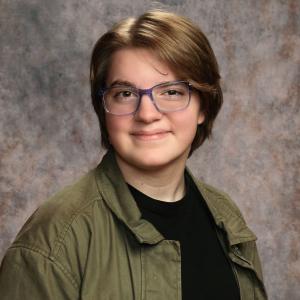 Sam Hebert; This is Sam's first show with PAC, and it's also the first show in their career at SUNY Fredonia. They are very proud of all the work that has been put into this show by everyone involved. It has been very fun being part of this process, and they can't wait to work on more shows in the future. Thank you to everyone who has come to see the show and support all the great work. Enjoy the show!
Sam Hebert; This is Sam's first show with PAC, and it's also the first show in their career at SUNY Fredonia. They are very proud of all the work that has been put into this show by everyone involved. It has been very fun being part of this process, and they can't wait to work on more shows in the future. Thank you to everyone who has come to see the show and support all the great work. Enjoy the show!
Lee Sholtz
 Lee Sholtz [he/him] is excited to be making his PAC debut with Lord of the Flies! Lee has previously been in Almost, Maine as Jimmy, The People Vs. Hero and Sidekick as The Judge, Dirty Rotten Scoundrels as Courier, and more. Lee wants to give a special thank you to his fellow cast mates and directors for making this experience special and amazing.
Lee Sholtz [he/him] is excited to be making his PAC debut with Lord of the Flies! Lee has previously been in Almost, Maine as Jimmy, The People Vs. Hero and Sidekick as The Judge, Dirty Rotten Scoundrels as Courier, and more. Lee wants to give a special thank you to his fellow cast mates and directors for making this experience special and amazing.
Abbie Paddock
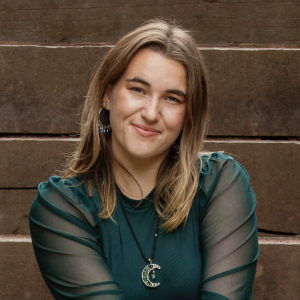 Abbie Paddock [she/her] is so excited to be in her first PAC show at Fredonia! In the past she has been in many high school and community productions including summers at Stagedoor Manor and Glimmerglass Opera. She would like to thank the entire cast and crew as well as her parents for supporting her every step of the way!
Abbie Paddock [she/her] is so excited to be in her first PAC show at Fredonia! In the past she has been in many high school and community productions including summers at Stagedoor Manor and Glimmerglass Opera. She would like to thank the entire cast and crew as well as her parents for supporting her every step of the way!
Clare Day
 Clare Day is a Freshman B.F.A. in Acting student and is so excited to make her PAC debut by playing Percival in Lord of The Flies. Before attending Fredonia she was a part of 8 plays and 5 musicals throughout her high school career. She also graduated with a concentration in Theatre from Kenmore West high school. She was a semifinalist in the ESU National Shakespeare Competition her senior year, competing on Broadway at the Mitzi E. Newhouse Theatre representing the Buffalo/Niagara region. Thank you to Muma, Dad, Erin, Henry, & Beauxie. Clare would like to thank anyone who has encouraged her along the way to continue following her dreams!
Clare Day is a Freshman B.F.A. in Acting student and is so excited to make her PAC debut by playing Percival in Lord of The Flies. Before attending Fredonia she was a part of 8 plays and 5 musicals throughout her high school career. She also graduated with a concentration in Theatre from Kenmore West high school. She was a semifinalist in the ESU National Shakespeare Competition her senior year, competing on Broadway at the Mitzi E. Newhouse Theatre representing the Buffalo/Niagara region. Thank you to Muma, Dad, Erin, Henry, & Beauxie. Clare would like to thank anyone who has encouraged her along the way to continue following her dreams!
Sim Smith
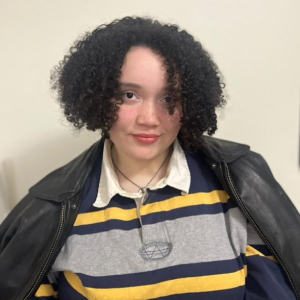 Sim Smith [she/he/they] is a freshman Musical Theater major from Mount Vernon, NY. They are ecstatic to make their PAC debut! Recent credits include Minnie (Parade), Casey (First Date), and the person chasing you at the end of Terror in the Trees last semester. She's a member of the PAC DEI committee and also preparing for FDE in May. They would like to give a special thank you to the cast and production team of LotF for making her first production at SUNY Fredonia such a wonderful experience.
Sim Smith [she/he/they] is a freshman Musical Theater major from Mount Vernon, NY. They are ecstatic to make their PAC debut! Recent credits include Minnie (Parade), Casey (First Date), and the person chasing you at the end of Terror in the Trees last semester. She's a member of the PAC DEI committee and also preparing for FDE in May. They would like to give a special thank you to the cast and production team of LotF for making her first production at SUNY Fredonia such a wonderful experience.
Christopher Buettner
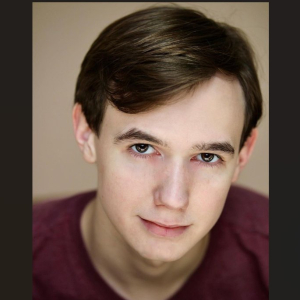 Christopher Buettner [he/him] is excited to be in his second PAC production! A sophomore BFA Musical Theatre major, his past credits here at Fredonia include Legally Blonde (Swing), Too Much Light Makes the Baby Go Blind (Actor/Deviser), and the 2023 Merrins Fall Chamber Concert (Dancer). He also serves on the PAC Executive Board as the Executive Assistant. From Gansevoort, NY, he has performed professionally in Broadway Upstate and Company of Curiosities’ production of Cabaret, and as an actor at Six Flags Great Escape. His upcoming credits include Fredonia Dance Ensemble (Dancer) and The Sound of Music (Friedrich). Chris is particularly excited to be making his debut as a Fight Captain within this production! He thanks the cast and team for giving him the opportunity to make art with all of them, and thanks them for putting up with his many hats. He would also like to thank his friends, family, and girlfriend Jocelyn for constantly supporting him.
Christopher Buettner [he/him] is excited to be in his second PAC production! A sophomore BFA Musical Theatre major, his past credits here at Fredonia include Legally Blonde (Swing), Too Much Light Makes the Baby Go Blind (Actor/Deviser), and the 2023 Merrins Fall Chamber Concert (Dancer). He also serves on the PAC Executive Board as the Executive Assistant. From Gansevoort, NY, he has performed professionally in Broadway Upstate and Company of Curiosities’ production of Cabaret, and as an actor at Six Flags Great Escape. His upcoming credits include Fredonia Dance Ensemble (Dancer) and The Sound of Music (Friedrich). Chris is particularly excited to be making his debut as a Fight Captain within this production! He thanks the cast and team for giving him the opportunity to make art with all of them, and thanks them for putting up with his many hats. He would also like to thank his friends, family, and girlfriend Jocelyn for constantly supporting him.
Cassie Gillen
 Cassie Gillen [she/her] is thrilled to be directing ‘Lord of the Flies’ alongside her dear friend Emily Youtt. She is a junior BFA Musical Theater & BS Dance major whose love for ‘Lord of the Flies’ comes from her sophomore year English class when the book was first introduced to her, and has stayed on her mind ever since. Previous Fredonia and PAC credits include: Legally Blonde (Pilar u/s & ensemble) Too Much Light Makes the Baby Go Blind (Divisor/Actor) Hamlet (Rosencrantz) and Natasha, Pierre & The Great Comet of 1812 (swing). She is also the proud co-captain of Random Acts Improv! She would like to thank everyone who ever listened to her talk about this play, her family, her best friend Noah, the cast & crew, and of course thank you to sweet Emily!
Cassie Gillen [she/her] is thrilled to be directing ‘Lord of the Flies’ alongside her dear friend Emily Youtt. She is a junior BFA Musical Theater & BS Dance major whose love for ‘Lord of the Flies’ comes from her sophomore year English class when the book was first introduced to her, and has stayed on her mind ever since. Previous Fredonia and PAC credits include: Legally Blonde (Pilar u/s & ensemble) Too Much Light Makes the Baby Go Blind (Divisor/Actor) Hamlet (Rosencrantz) and Natasha, Pierre & The Great Comet of 1812 (swing). She is also the proud co-captain of Random Acts Improv! She would like to thank everyone who ever listened to her talk about this play, her family, her best friend Noah, the cast & crew, and of course thank you to sweet Emily!
Emily Youtt
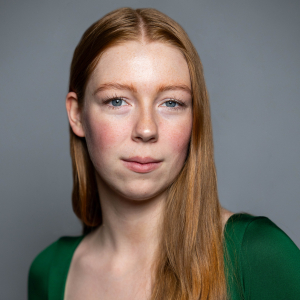 Emily Youtt [she/her] is ecstatic to make her directorial debut with a show that means so much to her. Originally from Leominster, MA, Emily is a junior achieving her bachelors degree in Theatrical Production and Design with a concentration in Lighting. Her previous credits include Legally Blonde (Head Electrician), The Book Women (Lighting Designer), and she looks forward to this summer where she will be a staff electrician and programmer at Barrington Stage Co. Endless gratitude to the entire cast and crew as her co-director Cassie. Love you always.
Emily Youtt [she/her] is ecstatic to make her directorial debut with a show that means so much to her. Originally from Leominster, MA, Emily is a junior achieving her bachelors degree in Theatrical Production and Design with a concentration in Lighting. Her previous credits include Legally Blonde (Head Electrician), The Book Women (Lighting Designer), and she looks forward to this summer where she will be a staff electrician and programmer at Barrington Stage Co. Endless gratitude to the entire cast and crew as her co-director Cassie. Love you always.
Gabbi Farr
 Gabbi Farr [they/she/he] is thrilled to be the Stage Manager of PAC’s production of Lord of the Flies! Past credits at SUNY Fredonia include: Stage Manager of PAC’s Too Much Light Makes the Baby Go Blind, Assistant Stage Manager of Senior Dance Projects, Assistant Director of Book Women, and Director for the One Act Play Festival! Gabbi would like to thank the cast and crew of Lord of the Flies for being so wonderful! Thank you for coming, and I hope you enjoy the show!
Gabbi Farr [they/she/he] is thrilled to be the Stage Manager of PAC’s production of Lord of the Flies! Past credits at SUNY Fredonia include: Stage Manager of PAC’s Too Much Light Makes the Baby Go Blind, Assistant Stage Manager of Senior Dance Projects, Assistant Director of Book Women, and Director for the One Act Play Festival! Gabbi would like to thank the cast and crew of Lord of the Flies for being so wonderful! Thank you for coming, and I hope you enjoy the show!
Carder Pawlak
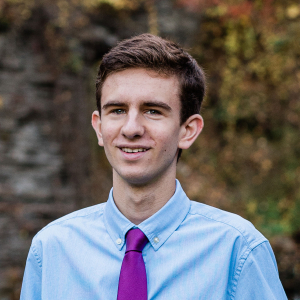 Carder Pawlak [he/him] is a freshman BFA Theatrical Production and Design major from Big Flats, NY. This is his first show with PAC (Fredonia Performing Arts Company) and third with SUNY Fredonia. Previous and current productions include Legally Blonde (Production Assistant) and Fredonia Dance Ensemble 2025 (Assistant Stage Manager). Carder would like to thank his family and friends for their continued support throughout this production. He would also like to thank the amazing cast and crew who made his first PAC show so enjoyable.
Carder Pawlak [he/him] is a freshman BFA Theatrical Production and Design major from Big Flats, NY. This is his first show with PAC (Fredonia Performing Arts Company) and third with SUNY Fredonia. Previous and current productions include Legally Blonde (Production Assistant) and Fredonia Dance Ensemble 2025 (Assistant Stage Manager). Carder would like to thank his family and friends for their continued support throughout this production. He would also like to thank the amazing cast and crew who made his first PAC show so enjoyable.
Fisher Sullivan
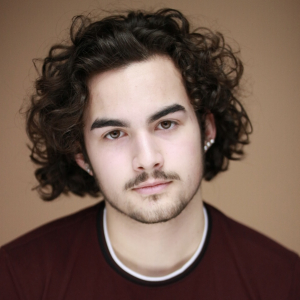 Fisher Sullivan [he/him] Hello everyone, thank you for coming!! This is my first time being behind the scenes of a show as Fight Choreographer and I couldn’t be more proud of everyone’s cooperation and support throughout this process. I think we really made something special and I hope you enjoy all the hard work me, the cast, and every other person have put into this show!
Fisher Sullivan [he/him] Hello everyone, thank you for coming!! This is my first time being behind the scenes of a show as Fight Choreographer and I couldn’t be more proud of everyone’s cooperation and support throughout this process. I think we really made something special and I hope you enjoy all the hard work me, the cast, and every other person have put into this show!
Katherine Eichenberger
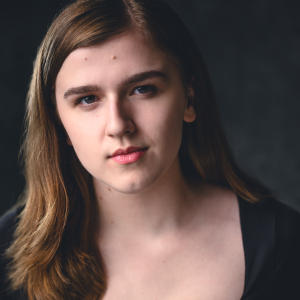 Katherine Eichenberger [she/they] is a senior BFA Acting major from Long Island, NY. Her previous dramaturgy credits include PAC’s This Is Our Youth, and the Mainstage productions of The Crucible and Abigail/1702. She has also performed in Mainstage productions, most recently as Erma Frey in The Book Women. Her next (and sadly last) theatrical endeavor at Fredonia will be directing two plays for the One Act Play Festival, as well as seeing her own play be premiered. Katherine is also a writer for Fredonia Night Live and a member of Some Like It Hot Acapella.
Katherine Eichenberger [she/they] is a senior BFA Acting major from Long Island, NY. Her previous dramaturgy credits include PAC’s This Is Our Youth, and the Mainstage productions of The Crucible and Abigail/1702. She has also performed in Mainstage productions, most recently as Erma Frey in The Book Women. Her next (and sadly last) theatrical endeavor at Fredonia will be directing two plays for the One Act Play Festival, as well as seeing her own play be premiered. Katherine is also a writer for Fredonia Night Live and a member of Some Like It Hot Acapella.
Harper Bogan
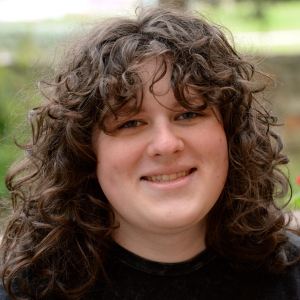 Harper Bogan [she/her] is a first year Technical Design and Production BFA with a concentration in Technical Direction. She is so excited and honored to be working on her first PAC show alongside such great people.
Harper Bogan [she/her] is a first year Technical Design and Production BFA with a concentration in Technical Direction. She is so excited and honored to be working on her first PAC show alongside such great people.
Joseph Morcelle
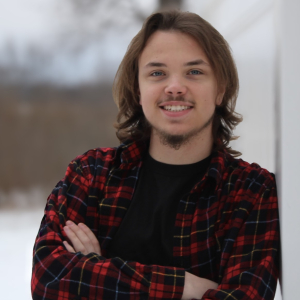 Joseph Morcelle [he/him] is a sound designer who grew up in West Seneca and graduated from Saint Francis High school. He dreams of becoming a professional Sound designer, Sound Engineer and Live Mixer. His hobbies include creating soundscapes as well as writing short stories. Joseph is adept with Qlabs and Audacity as programs. He strives every day to hone his skills.
Joseph Morcelle [he/him] is a sound designer who grew up in West Seneca and graduated from Saint Francis High school. He dreams of becoming a professional Sound designer, Sound Engineer and Live Mixer. His hobbies include creating soundscapes as well as writing short stories. Joseph is adept with Qlabs and Audacity as programs. He strives every day to hone his skills.
Jaydon Zullo
 Jaydon Zullo [he/him] is a sophomore BFA Theatrical Production and Design major with a focus in Lighting. Jaydon’s Mainstage credits this season include, Legally Blonde: Assistant Lighting Designer, Cosi fan tutte: Head Electrician, Alicia's Lens: Head Electrician, One Act Play Festival: Assistant Lighting Designer. Outside of productions, Jaydon is the Vice Chair FUSITT, as well as a learning assistant for a couple of classes in the theatre department. This summer, Jaydon will be the Assistant Head Electrician at Maine State Music Theatre. This is Jaydon’s PAC debut, and he’s excited to work more with the club in the future!
Jaydon Zullo [he/him] is a sophomore BFA Theatrical Production and Design major with a focus in Lighting. Jaydon’s Mainstage credits this season include, Legally Blonde: Assistant Lighting Designer, Cosi fan tutte: Head Electrician, Alicia's Lens: Head Electrician, One Act Play Festival: Assistant Lighting Designer. Outside of productions, Jaydon is the Vice Chair FUSITT, as well as a learning assistant for a couple of classes in the theatre department. This summer, Jaydon will be the Assistant Head Electrician at Maine State Music Theatre. This is Jaydon’s PAC debut, and he’s excited to work more with the club in the future!
Jharrel Liam Bernardo
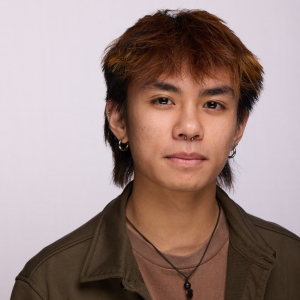 Jharrel Liam Bernardo [he/they] is a junior BFA Prod. & Design major with a focus in Properties and Scenic Design from Long Island, NY. His previous PAC credits include This is Our Youth (ATD), Hamlet (Scenic Designer), Little Women (Technical Director), Too Much Light Makes the Baby Go Blind (Technical Supervisor), Company (Scenic Designer). This summer he worked in Leesburg, VA with a classical theatre summer camp! Yipee, enjoy lord of the freaks!!! See what I'm doing next! @jharrel.liam
Jharrel Liam Bernardo [he/they] is a junior BFA Prod. & Design major with a focus in Properties and Scenic Design from Long Island, NY. His previous PAC credits include This is Our Youth (ATD), Hamlet (Scenic Designer), Little Women (Technical Director), Too Much Light Makes the Baby Go Blind (Technical Supervisor), Company (Scenic Designer). This summer he worked in Leesburg, VA with a classical theatre summer camp! Yipee, enjoy lord of the freaks!!! See what I'm doing next! @jharrel.liam
Mia Rivas
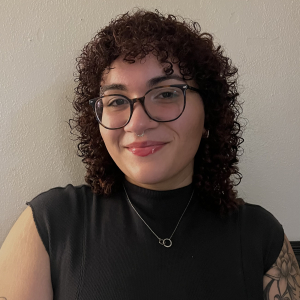 Mia Rivas [she/her] is so excited to be working on Lord of the Flies with Jharrel. This is her first PAC show and is happy to be co-scenic designing it. She is also currently working on paints and props for Alicia’s Lens and being the Assistant Charge Artist on Twelfth Night.
Mia Rivas [she/her] is so excited to be working on Lord of the Flies with Jharrel. This is her first PAC show and is happy to be co-scenic designing it. She is also currently working on paints and props for Alicia’s Lens and being the Assistant Charge Artist on Twelfth Night.
Simon Szentgyorgyi
 Simon Szentgyorgyi [they/them] is a senior BA Theatre Arts student who specializes in stage makeup and costuming. Most recently, they designed hair and makeup for Alicia's Lens, the 2025 Fredonia Young Company production. Previous works at Fredonia include Legally Blonde: The Musical, The 25th Annual Putnam County Spelling Bee, and more. This is their first time costume designing a production, and they are incredibly grateful for the opportunity. Simon would like to thank Cassie, Emily, Gabbi, and the entire Lord of the Flies team for being such wonderful colleagues.
Simon Szentgyorgyi [they/them] is a senior BA Theatre Arts student who specializes in stage makeup and costuming. Most recently, they designed hair and makeup for Alicia's Lens, the 2025 Fredonia Young Company production. Previous works at Fredonia include Legally Blonde: The Musical, The 25th Annual Putnam County Spelling Bee, and more. This is their first time costume designing a production, and they are incredibly grateful for the opportunity. Simon would like to thank Cassie, Emily, Gabbi, and the entire Lord of the Flies team for being such wonderful colleagues.
Madison Conklin
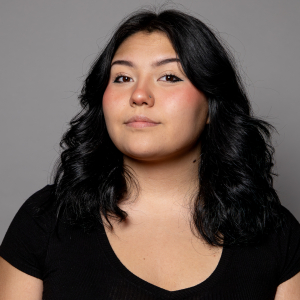 Madison Conklin [she/her] is a sophomore BFA Theatre Production and Design major with a Scenic focus, from Orange County, NY. Past SUNY Fredonia departmental credits include The Book Women (Asst. Charge Artist), Legally Blonde (ASM), Natasha, Pierre, and The Great Comet of 1812 (ASM), The Crucible (Asst. Props Supervisor), and Abigail/1702: A Twice Told Tale (Asst. Props Supervisor). Mads also worked with PAC, the student run performing arts company on campus, on The 25th Annual Putnam County Spelling Bee (Stage Manager) and The Baltimore Waltz (Costume Designer, ASM, Hair and Makeup Designer).
Madison Conklin [she/her] is a sophomore BFA Theatre Production and Design major with a Scenic focus, from Orange County, NY. Past SUNY Fredonia departmental credits include The Book Women (Asst. Charge Artist), Legally Blonde (ASM), Natasha, Pierre, and The Great Comet of 1812 (ASM), The Crucible (Asst. Props Supervisor), and Abigail/1702: A Twice Told Tale (Asst. Props Supervisor). Mads also worked with PAC, the student run performing arts company on campus, on The 25th Annual Putnam County Spelling Bee (Stage Manager) and The Baltimore Waltz (Costume Designer, ASM, Hair and Makeup Designer).
Viktor Feness
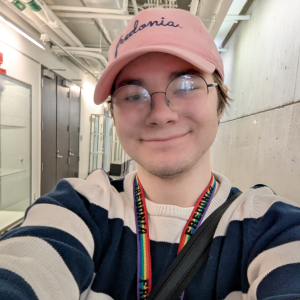 Viktor Feness; Lord of the Flies is Viktor's First PAC production, and their second show as a student at SUNY Fredonia, working previously on Fredonia's production of Legally Blonde. They are very excited to bring the soundscape of Lord of the Flies to you, and look forward to their many productions in their future at Fredonia.
Viktor Feness; Lord of the Flies is Viktor's First PAC production, and their second show as a student at SUNY Fredonia, working previously on Fredonia's production of Legally Blonde. They are very excited to bring the soundscape of Lord of the Flies to you, and look forward to their many productions in their future at Fredonia.
PAC Executive Board
Aidan Heaney
Executive Producer
Rhiannon Craver
Associate Executive Producer
Holden Stevenson
Director of Finance
Leilanis Sanchez
Company Manager
Dylan Burley
Associate Company Manager
Julia Ferrara
General Manager
Gabbi Farr
Director of Performance and Outreach
Jharrel Liam Bernardo & Ronnie Swan
Co - Production Managers
Nyles Emile
DEI Chair
Nini Rodriguez
Director of Operations
Christopher Buettner
Executive Assistant
Giulia Beaudoin
Director of Development